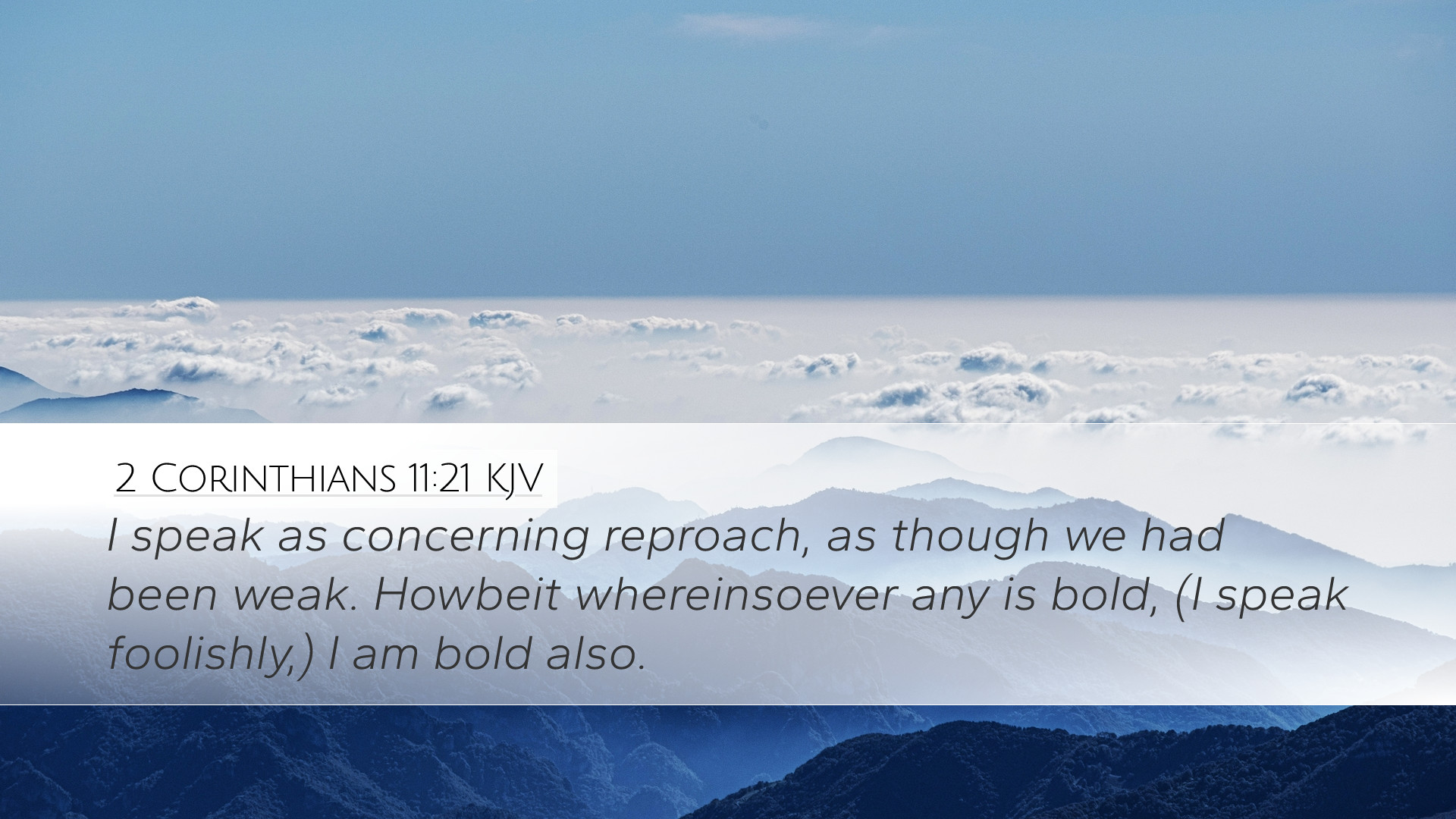Commentary on 2 Corinthians 11:21
Text of 2 Corinthians 11:21: "I speak as concerning reproach, as though we had been weak. Howbeit whereinsoever any is bold, I speak foolishly; I am bold also."
Introduction
The apostle Paul, in this verse, reflects on his apology for seeming to boast, a practice considered unwise but necessary in context. His intent is to establish his credentials and defend his apostolic authority against false teachers and the criticisms they have levied against him.
Contextual Background
This portion of 2 Corinthians is rooted in a broader discourse where Paul contrasts his ministry with that of self-appointed apostles who mislead the Corinthians. The chapter is a poignant declaration of his apostolic credentials through his sufferings, hardships, and unwavering commitment to Christ.
Exegesis of 2 Corinthians 11:21
The verse begins with a reflection on “reproach,” a theme consistent throughout Paul’s letters where he acknowledges the struggles and challenges faced in his ministry. He admits a perception of weakness, which evokes profound theological implications regarding strength, power, and divine calling.
Insights from Public Domain Commentaries
Matthew Henry
Matthew Henry comments on the paradox of boasting in weakness, indicating that true strength arises not from personal accolades but from the sufferings endured for the sake of Christ. He asserts that Paul’s admission of “weakness” is a rhetorical strategy to refocus the Corinthians on the genuine experience of grace and strength derived from God in moments of vulnerability.
Albert Barnes
Albert Barnes emphasizes that when Paul speaks “foolishly,” he does so to contrast with the brash boasting of his opponents. He argues that boasting in accomplishments is senseless unless it directly points to God’s work in one’s life. Barnes highlights that true apostleship is measured not by credentials or eloquence, but by the suffering one endures for the faith.
Adam Clarke
Adam Clarke brings forth an analytical lens on Paul’s use of “boldness,” describing it as a necessary step to defend his authority. He notes that Paul does not take pleasure in boasting or speaking of his achievements, but feels compelled to respond to the accusations against him. Clarke underlines that Paul wishes to display his credentials to reclaim the trust of the Corinthian church.
Theological Implications
This verse encapsulates the paradox of strength in weakness, a recurring theme in Pauline theology. Paul is articulating a foundational truth of Christian ministry—the idea that God's power is made perfect in our weaknesses (cf. 2 Corinthians 12:9). The implications of this revelation are multi-faceted:
- Strength in Weakness: The acknowledgment of one’s vulnerabilities can serve as a testimony of God’s sustaining grace, encouraging believers to rely not on their strength but on divine empowerment.
- Authority in Suffering: Paul’s sufferings serve as validation for his calling. Those in leadership roles must often endure trials yet rise to the task with integrity and faithfulness.
- Authentic Leadership: In a culture that often equates success with power and prestige, Paul’s model of leadership through suffering challenges contemporary definitions of authority.
Reflective Applications
For pastors and theologians, this passage offers an opportunity for reflection on their own lives and ministry:
- Examine Motives: It is essential to reflect on the reasons for one's ministry. Are they rooted in humility or self-aggrandizement?
- Embrace Vulnerability: Believers are encouraged to share their struggles and weaknesses within their communities, fostering an environment of grace and mutual support.
- Perspective on Suffering: Leaders should remember that enduring hardships can deepen their faith and lead to greater reliance on God’s grace.
Conclusion
2 Corinthians 11:21 serves as a critical reminder of the transformative power of Christ’s work in believers’ lives, particularly through moments of weakness and challenge. Paul’s defense of his ministry encourages a reassessment of how we perceive strength, authority, and leadership within the church. Ultimately, boasting in Christ and the work He accomplishes through us, especially in light of our weaknesses, is the genuine proclamation of faith that Paul models throughout his writings.


